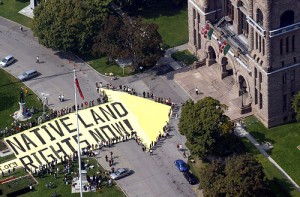Major logging company vows to avoid Grassy Narrows conflict wood
Giant lumber firm vows to stay clear of Grassy Narrows
EACOM Timber Corporation has committed not to use conflict wood from Grassy Narrows First Nation Territory, home of Canada's longest running Indigenous logging blockade. The promise comes just one week before Ontario's contentious new ten-year clearcut logging plan for Grassy Narrows Territory in the Whiskey Jack Forest is scheduled to take effect. Ontario Regional Chief Stand Beardy has called for immediate blockades if logging resumes under the plan.
RELEASE Wednesday March 26, 2014
Major lumber company vows to avoid Grassy Narrows conflict wood
Toronto – EACOM Timber Corporation has committed not to use conflict wood from Grassy Narrows First Nation Territory, home of Canada's longest running Indigenous logging blockade. The promise comes just one week before Ontario's contentious new ten-year clearcut logging plan for Grassy Narrows Territory in the Whiskey Jack Forest is scheduled to take effect. Ontario Regional Chief Stand Beardy has called for immediate blockades if logging resumes under the plan.
"To hear a huge logging company commit not to use trees from our territory is such good news in our struggle to protect the forest and to keep our culture alive." said Judy Da Silva, a Grassy Narrows mother of five, clan mother, and blockader. "I am hoping that Weyerhaeuser Corp. will do the same and listen when we say 'no' to logging. This is for the good of all future generations who need clean water and air."
Grassy Narrows First Nation has rejected Ontario's new Whiskey Jack Forest Management Plan, which plans for a decade of clearcut logging throughout their Territory, on the basis that it does not respect their rights and is damaging to their environment. The final plan was posted online by the Ministry of Natural Resources on December 23, 2013, and is scheduled to take effect on April 1, 2014.
EACOM owns 10 mills in Canada, with six sawmills in Ontario, including the large Ear Falls sawmill which is located in close proximity to Grassy Narrows Territory in Northwestern Ontario. This commitment leaves Weyerhaeuser and Kenora Forest Products isolated as the only large regional forest products companies who have not committed publicly to avoid Grassy Narrows conflict wood.
The commitment was made in a letter to environmental group Earthroots sent Mondayafternoon. In the letter Keith Ley, EACOM Manager of Forest Planning and Environment, states that "EACOM will not knowingly source wood fiber from the self-declared traditional territory of the Grassy Narrows First Nation on the basis of the ongoing dispute and efforts at resolution."
Grassy Narrows is concerned that the planned logging could harm the health of their families by raising mercury poison levels in local fish. The logging plan makes no mention of mercury, even though Grassy Narrows Territory is the site of Canada’s most infamous case of mercury poisoning arising from 9,000 kg of mercury that was dumped into a local river by a paper mill upstream in the 1960’s. Scientific studies indicate that clearcut logging in the boreal forest can raise mercury in fish to unsafe levels.
“Ontario has ignored our voices, and is planning to force more devastating clearcuts on our people,” said Joseph Fobister, a Grassy Narrows hunter and businessman. “Our people will become even more sick if the government knowingly allows the logging industry to poison the fish that we eat.”
Premier Wynne visited Grassy Narrows in the summer of 2012 as Minister of Aboriginal Affairs, saying that she wanted to rebuild Ontario's relationship with Grassy Narrows to "get it right." Instead Ontario has unilaterally pursued this clear-cut logging plan against the will of the community and without consent. Grassy Narrows explains that this logging will further erode the Aboriginal and Treaty Rights of the community which depends on the forest to sustain their families and to practice their culture through fishing, hunting, trapping, medicine harvesting, ceremony and healing for all generations.
"EACOM has done the right thing by listening to the people of Grassy Narrows when the community says 'no' to logging," said David Sone of the environmental group Earthroots "It is time for Ontario to finally respect the families of Grassy Narrows and stop trying to force devastating clearcuts on the community against their will. "
The Supreme Court of Canada will hear Grassy Narrows' case against Ontario on May 15, in a legal action which argues that Ontario does not have the right to unilaterally permit logging on Grassy Narrows land north of the English River due to promises made by Canada in Treaty 3.
Ontario has said that they will not allow logging on the part of Grassy Narrows Territory which is subject to the legal action until the Supreme Court has ruled. However, Ontario has clarified that they may allow logging on the southern half of Grassy Narrows Territory which is not subject to the Supreme Court Decision. A map in the new Whiskey Jack Forest Management Plan shows large clearcuts planned throughout Grassy Narrows Territory starting as soon as April 1.
The United Nations Declaration on the Rights of Indigenous Peoples, to which Canada is a signatory, requires that the free, prior, and informed consent of Indigenous peoples is given before industrial activity is permitted on their traditional lands.
Grassy Narrows is the site of the longest running native logging blockade in Canadian history – an ongoing grassroots action started in December 2002 that recently celebrated its 11th anniversary. Grassy Narrows youth, elders, women, and land-users put their bodies on the line to stop logging trucks from passing.
Logging in Grassy Narrows Territory has been suspended since June 2008 when Boise and AbitibiBowater (now Resolute) bowed to the pressure of protests, blockades, boycotts, and legal actions by ceasing to source wood from Grassy Narrows Territory without consent and surrendering their license on the Whiskey Jack Forest.
CONTACT: Judy Da Silva: 807-407-4430, Joseph Fobister: (807) 407 2745, David Sone: 647-772-8770





